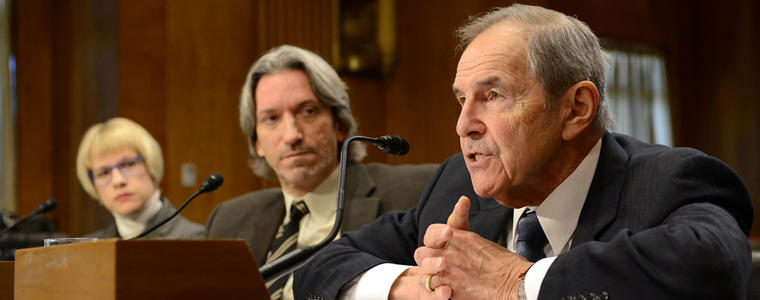U.S. officials and senators warned that South Sudan’s warring leaders risk losing American backing unless they end violence that has killed more than 1,000 people in the past month, and experts such as the U.S. Institute of Peace’s Princeton Lyman urged that the international community take a more assertive role.

In addition to the deaths, more than 200,000 South Sudanese have fled their homes and the country’s plentiful oil wells have largely stopped functioning, according to testimony at a hearing of the Senate Foreign Relations Committee in Washington. Nancy Lindborg, an assistant administrator at the U.S. Agency for International Development, described the difficulty of delivering humanitarian aid as “spontaneous settlements of displaced people” crop up, including 30,000 people found on Jan. 8.
“We are all deeply, deeply alarmed,” Lindborg said.
The hearing today, on the third anniversary of South Sudan’s referendum that led to independence in 2011, was prompted by the sudden eruption of new violence on Dec. 15, after a year of escalating political rifts between President Salva Kiir and the vice president he dismissed in July, Riek Machar.
“Today, tragically, the world’s youngest country -- and undoubtedly one of the most fragile democracies -- is in danger of shattering,” Assistant Secretary of State for African Affairs Linda Thomas-Greenfield told the committee. “Political rivalries have taken on ethnic dimensions. Atrocities are being committed. Men, women, children are caught in the crossfire.”
Thomas-Greenfield said neither the U.S. nor the international community would countenance the violent overthrow of a democratically-elected government, while committee Chairman Robert Menendez, a New Jersey Democrat, said continuing violence would “jeopardize future U.S. engagement and further U.S. assistance.”
Menendez cited a previous admonition by Secretary of State John Kerry that all parties in the conflict “must make serious efforts to seek an inclusive political solution.”
Lyman, the former U.S. special envoy to Sudan and South Sudan, stressed that the United Nations peacekeeping mission in South Sudan urgently needs reinforcement and should actively carry out its mandate to protect civilians and, ultimately, to monitor any ceasefire.
Stabilizing South Sudan and ensuring a lasting peace also will require more than crafting a resolution of the current dispute between Kiir and Machar, and more than a return to the shaky conditions that existed before, Lyman said in his testimony.
“There needs to be a process that gets at basic structures of government, enough protection for democracy and human rights, for how parties are supposed to operate,” Lyman said. “The constitutional process in South Sudan has not moved forward. That gives us a vehicle for greater participation by civil society, churches, and other interest groups.”
He joined Thomas-Greenfield and Lindborg in calling for Kiir to release 11 senior South Sudanese political leaders who were detained last month, after the president accused Machar of attempting a coup. The group isn’t aligned with either of the two leaders but has been, like Machar, critical of the government’s neglect of vital issues, Lyman said.
John Prendergast, co-founder of the genocide prevention advocacy group the Enough Project, advised that a U.S. team be formed to support the peace process that has begun in Addis Ababa, Ethiopia. U.S. policy on the ground is being led by Special Envoy for Sudan and South Sudan Donald Booth at the talks in Ethiopia and U.S. Ambassador Susan Page in Juba.
Thomas-Greenfield and Prendergast said China appears to be playing a constructive role. The South Sudan situation could be an opportunity for the U.S. to work closely with China on an issue where both have vital interests, Prendergast said.
Foreign Relations Ranking Member Bob Corker, a Tennessee Republican, said that while neighboring countries are involved, “this is a place where, obviously, people expect us to make a difference.”
Lyman said the U.S. and others should take a more active role in South Sudan’s governance and economy between any agreement reached in Addis Ababa and the next election. He estimates the U.S. has dedicated $12 billion since 2005 to Sudan and South Sudan for efforts including peacekeeping, humanitarian aid and development, an investment that he says compels deeper involvement to ensure success.
In a new USIP paper, Lyman and co-authors Jon Temin and Susan Stigant propose “a degree of joint South Sudanese-international community administration and management.” Temin is director of USIP’s Africa program, and Stigant is a senior program officer at USIP. They cited as a possible model the Governance and Economic Management Assistance Program for Liberia.
“We can’t turn back on this,” Lyman said. “It’s going to take a lot of time and effort. If we recognize the fundamental weaknesses in these institutions, we and our partners can start to address this.”